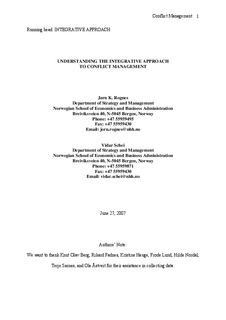| dc.contributor.author | Rognes, Jørn Kjell | |
| dc.contributor.author | Schei, Vidar | |
| dc.date.accessioned | 2015-08-26T09:59:08Z | |
| dc.date.accessioned | 2015-08-26T10:16:57Z | |
| dc.date.available | 2015-08-26T09:59:08Z | |
| dc.date.available | 2015-08-26T10:16:57Z | |
| dc.date.issued | 2010 | |
| dc.identifier.citation | Journal of Managerial Psychology 2010, 25(1):82-97 | nb_NO |
| dc.identifier.issn | 0268-3946 | |
| dc.identifier.uri | http://hdl.handle.net/11250/297981 | |
| dc.description | -"This article is (c) Emerald Group Publishing and permission has been granted for this version to appear here. Emerald does not grant permission for this article to be further copied/distributed or hosted elsewhere without the express permission from Emerald Group Publishing Limited." - See more at: http://www.emeraldgrouppublishing.com/authors/writing/author_rights.htm#sthash.PFWtc2DK.dpuf | nb_NO |
| dc.description.abstract | The purpose of this paper is to examine the integrative approach to conflicts.
Integration is an active search for information about facts and interests - motivated by a
willingness to find mutually satisfactory agreements - and is usually necessary for creating
high quality settlements in conflicts. Thus, in order to understand how to avoid win-lose
outcomes, or impasses, we need knowledge about factors that relate to, and promote,
integration. We here use five data-sets to explore factors relating to individuals’ inclination to
integrate. Our results show that (a) degree of integration varies, that (b) the variation can be
explained by individual differences, by situational differences, and to some degree by group
differences, and that (c) integration predicts high quality outcomes in conflicts. | nb_NO |
| dc.language.iso | eng | nb_NO |
| dc.publisher | Emerald Group Publishing Limited | nb_NO |
| dc.relation.uri | http://www.emeraldinsight.com/doi/full/10.1108/02683941011013885 | |
| dc.subject | conflict management | nb_NO |
| dc.subject | negotiation | nb_NO |
| dc.subject | integrative style | nb_NO |
| dc.subject | integrative behavior | nb_NO |
| dc.title | Understanding the integrative approach to conflict management | nb_NO |
| dc.title.alternative | Understanding the integrative approach to conflict management | |
| dc.type | Journal article | nb_NO |
| dc.type | Peer reviewed | |
| dc.date.updated | 2015-08-26T09:59:08Z | |
| dc.source.pagenumber | 82-97 | nb_NO |
| dc.source.volume | 25 | nb_NO |
| dc.source.journal | Journal of Managerial Psychology | nb_NO |
| dc.source.issue | 1 | nb_NO |
| dc.identifier.cristin | 855335 | |
